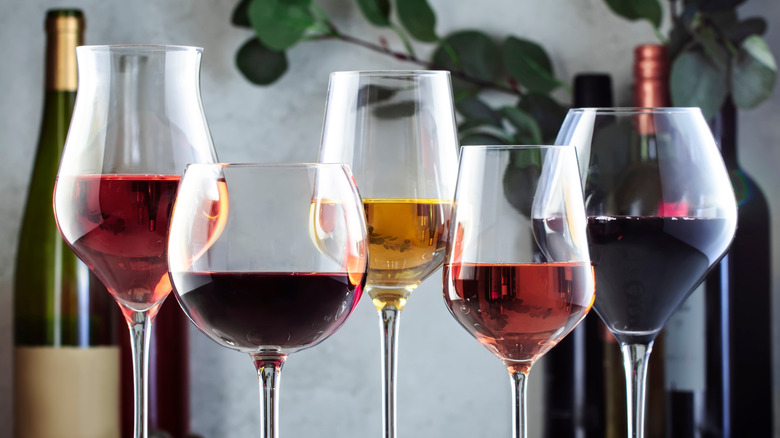Just So You Know, Not All Wine Is Vegan
Whether you're making the commitment to go entirely vegan or if you're just trying to make more mindful choices to include vegan (and vegetarian) products into your diet, you've probably realized pretty quickly that it's not as straightforward as it might seem. While there are a lot of snack foods that surprisingly are vegan — like Oreos, Twizzlers, and some popcorn — there are plenty of others that aren't as free from animal products as you might expect.
For example, you'll need to be careful when eating jelly beans as a vegan, and the thing about drinks is that they're even trickier. Let's take wine. Unless a wine label indicates that it's vegan-friendly, or that it's been certified under the guidelines of a legal firm like BevVeg!, there's a good chance that some surprising animal byproducts were used in the making of your wine.
Those products aren't ingredients in quite the same way as grapes; instead, they're used as what's called fining agents. Fining is a process where additives are used to help speed up the clarification process, which gets rid of cloudiness and sediment. When left to do that naturally, it can take a while. Add certain animal byproducts, and it can be done much quicker. Are you drinking these products along with the wine? They're technically removed from the final product — which is one reason why they're not required to be labeled as an ingredient — but for anyone who is 100% vegan, there is still a concern that these products are not, in fact, vegan or even vegetarian.
What kind of animal products are used in wine-making?
When winemakers reach the clarification process, some speed up clarification by adding ingredients that essentially attract unwanted particles and pull them out of the wine. There are a number of different things that can be used here. If you've ever heard that oft-repeated bit of internet trivia that claims there's fish bladder in your wine, that could be partially true: It's called isinglass.
Isinglass isn't used as often as it used to be, but many of the other products used for the same reason aren't vegan — and sometimes, they aren't vegetarian. Gelatin, for example, is neither — it's made from animal bones and hides. Similarly, there's chitosan (or chitin). That's typically used in processing white wines, and it's made from crustacean shells. Some wineries use albumen (from egg whites), fish oil, or even blood and bone marrow. Casein is another common one: This milk protein is considered vegetarian, but it's not vegan.
What if you're looking for a vegan wine? Orange wine is often touted as a great option for pairing with vegan meals, and we do have some good news for you. Wines that are unfiltered (or unfined) haven't gone through the process that introduces animal byproducts, so that's a good sign. There are also wineries that are turning to vegan-friendly fining agents like activated charcoal and a clay agent called bentonite. Natural wine-makers are stressing animal-free processes, but if you have any doubts, ask at the store, inquire with the brand, or do some good, old-fashioned internet sleuthing.

